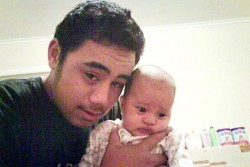Back in January 2009 Auckland’s motorists were going about their business in what had started out as a normal day, but by the end of the day one off them, 17 year old courier van driver Halatau Ki’anamanu Naitoko, would be dead; killed by a New Zealand police AOS sniper. What’s more another innocent Auckland motorist would be left critically wounded, sentenced to a life of suffering and the slow realization of financial ruin.
For months after the shooting the media focused only on the young courier driver who was fatally shot and his grieving family. Little, if any, mention was made of another victim of the police’s gross incompetence was made. A rather curious situation; especially given the extent of the serious “life and death” , near fatal, injuries that had also been sustained by the second casualty. It was only a year later when a second victim was shown passing media interest by the Herald on Sunday’s opportunist, posing as a journo, Matt Nippert;
Shooting survivor gives up his job
January 24, 2010
One year on from the police motorway shooting that killed Halatau Naitoko, survivor Richard Neville has realised that his life will never be the same.
Yesterday, he decided yesterday to give up his profession because he could no longer drive his truck to jobs.
The metalsmith and father of two, caught in the crossfire, had his left arm peppered with 17 bullet fragments.
“I made a decision today. My partner and myself decided to sell the truck,” he said.
“In one year I’ve driven less than 140km – because I can’t drive with the injuries to my arm. From a financial point of view, what’s the point of keeping it?”
After a battle of compensation, Neville is receiving ACC payments and said his injuries caused him continuing difficulty.
“I’m pretty much in the process of redefining my work, or finding a new job.
The police inquest into Naitoko’s death has been adjourned until February 16, and Neville said the delay has been hard for all involved.
“I feel for the Naitoko family, they still don’t have any answers as to why their son was killed – that’s a bit raw,” he said.
“I quite often get told to get on with life, but it’s quite difficult when society hasn’t finished its involvement with you through the legal process. I wish the wheels of justice moved a bit faster.”
The past year has not all been sombre rehabilitation, however. Wedding bells are ringing this year for Neville and his partner Donna.
“I’m getting married this year,” he said. “Life goes on, it changes and evolves”
Source: http://www.nzherald.co.nz/nz/news/article.cfm?c_id=1&objectid=10621938
Following the shootings there was the obligatory, so-called, police inquiry, which kept stalling, then an IPCA inquiry with all of its inherent problems, followed by a coronial inquiry and yet the police managed to slip through everyone of these investigations without anyone being held responsible, another noose that anywhere other than New Zealand would undoubtedly have resulted in criminal negligence and or manslaughter indictments being laid against the officers responsible for the shooting and or their immediate superiors.

Senior Kiwi police officer Detective Inspector Peter Devoy, during the Coronial Inquest, described the anonymous policeman who shot innocent bystander Naitoko as extremely brave. Just how much did the police conceal? Devoy was also up to his neck in the coverups surrounding police abuses in the Dotcom raid.
As always however, nothing whatsoever resulted from any one of the inquiries other than a slap on the wrist. Police, as is always the case in New Zealand, given a get out of jail free card, only to also be rubber stamped by the country’s compliant MSM, no doubt much to the disbelief and distress of the surviving victims and their families.
The repercussions of that day sad will undoubtedly still be reverberating amongst those left to grieve, left trying to cope with the loss of a husband, father and family breadwinner.

17 year old father of one Halatau Naitoko, shot dead by a police officer that was not named and who police it would seem may not have been able to identify in any event. Corruption or incompetence, or both?
Certainly more of the details than at the time had been behind pushed behind a veil of police secrecy were again being heard in New Zealand’s High Court last June when another of the police victims was attempting to obtain justice and with it compensation for a life that had been all but destroyed.
As was to be expected New Zealand’s well resourced crown law office, representing police, dismissed the claims as “fanciful” and “so speculative they should be struck out”
Auckland man sues police over accidental shooting
July 15, 2015
Claims by an innocent bystander caught in the crossfire of a police shoot-out were “fanciful” and “so speculative they should be struck out”, the Crown says.
Richard Neville is suing police for $1.4 million after he was injured in the January 2009 gun battle with offender Stephen McDonald on Auckland’s north-western motorway.
Courier driver Halatau Naitoko was accidentally killed in the shoot-out.
McDonald, high on drugs, had been stealing cars at gunpoint and shooting at police for almost an hour until he leaped on the back of the truck Neville was driving.
Police shot at McDonald and accidentally hit Neville in the exchange and those shots are the centre of the current case.
Neville contends police acted unsafely by trying to shoot at McDonald, who was on the back of his truck, by shooting though his windscreen.
Police say they first shot at McDonald while he was standing next to the truck and the shot that penetrated the windscreen and injured Neville was an accident.
Crown lawyer Peter Gunn said it was “inherently implausible” that a trained armed offenders officer would try and shoot through two panes of glass – the truck’s windscreen and back window – to try and hit an offender.
Gunn applied to the High Court to have the case struck out on Wednesday saying it “either cannot succeed or the factual claims are so speculative that they should be struck out”.
Justice Geoffrey Venning questioned Gunn’s application for a summary judgement saying the difference over whether the bullet that hit the windscreen was deliberate or accidental was “the type of thing that would be flushed out at trial.”
The claim was brought under section 9 of the New Zealand Bill of Rights Act – the right not to be subjected to torture or cruel treatment.
Gunn said police had not infringed that right in Neville’s case.
The leading legal decision on the right to be free of torture spoke of acts that created “shock and revulsion” at their use, he said.
Police had acted in an emergency situation to protect the public and what occurred was an accident, Gunn said.
The claim should be struck out “to avoid the cost and trauma of a lengthy trial that would inevitably come to the conclusion that (Neville) was not entitled to Bill of Rights compensation”, he said.
Gunn said police had made a substantial “ex gratia” payment to Neville to recognise the “considerable difficulties” Neville had suffered.
Neville said he now wore two hearing aids, had trouble sleeping due to bullet fragments still in his body, had numbness in parts of his face and fingers and had mental trauma from the incident.
Neville’s lawyer Charl Hirschfeld said there was only limited evidence before the court.
His client had given a “detailed credible narrative” of the shooting and there was no affidavit from the office who fired the shots.
“Despite what my learned friend might say, this narrative is neither fanciful nor speculative.”
Hirschfeld said police had a duty to discharge their weapons so they did not injure the public but the shots were fired with “reckless indifference”.
“Four shots were fired, one civilian was killed, one civilian was injured”
The IPCA report into the incident said the shots were “not accurate or safe”, Hirschfeld said.
Justice Venning reserved his decision. The hearing continues.
That civil tort, conceived, executed and argued relying New Zealand’s Bill of Rights Act was, tragically for the victims, dismissed by New Zealand’s High Court Justice Geoffrey Venning last month.
Court rejects compo for police shooting
August 17, 2015
The High Court has thrown out a bid for compensation from an innocent bystander who the police shot and wounded on an Auckland motorway.
Richard Neville was driving his truck along Auckland’s north-western motorway when he was hit by shots fired by police.
They were chasing the fugitive gunman Stephen McDonald in 2009.
Officers also shot and killed another bystander, Halatau Naitoko, who was 17.
Mr Neville was trying to sue under the Bill of Rights, claiming he had the right to not face severe treatment by the police.
But the Attorney-General applied to have the claim struck out, which the High Court has done.
Justice Venning said while his injuries could not be discounted, other factors such as the emergency situation needed to be taken into account.
“The police identified Mr McDonald as presenting a risk to life and the public in general and in that sense the actions of shooting at him can be seen as proportionate,” Justice Venning said.
“I do not consider the treatment of Mr Neville by the State, if indeed there was such treatment in this case, can be said to be disproportionately severe.
“The police action cannot be categorised as treating Mr Neville as less than human,” the judge said in a written decision.
He said he could have pursued a claim for exemplary damages for personal injury after he was shot, but he did not.
“Mr Neville could have pursued such a claim within two years of the incident or, with leave of the court, within six years.
“For whatever reason Mr Neville did not bring such a claim,” Justice Venning said.
Mr Neville said when he took his case to the High Court that he felt like the little guy throwing stones at the Goliath-like police force.
He said last month the long-term effects of being shot by police would get worse as he got older.
“Because I have lots of parts of foreign particles in my body – lead and glass and tungston and copper – all of these things are not good,” he said outside court at the time.
Source: http://www.radionz.co.nz/news/national/281618/court-rejects-compo-for-police-shooting
Team LF have now received inside information from a whistleblower source alleging that the police sniper responsible for those shootings was in fact a female officer who had at the time just failed a mandatory gun related skill assessment and testing.

Richard Neville, his wife Donna and his two sons have been screwed by authorities ever since he was shot by an incompetent police AOS officer during the 2009 motorway shoot-out, a complete balls-up that also saw fellow bystander Halatau Naikoko shot dead by police.
A police officer who by all accounts should not have even been allowed to use any weapon whilst on active duty, and who by all accounts should also have been suspended from AOS duties immediately following the failed testing.
it was “inherently implausible” that a trained armed offenders officer would try and shoot through two panes of glass – the truck’s windscreen and back window – to try and hit an offender – Peter Gunn (Barrister representing the Crown)
When this new information is thrown into the mix then the Crown’s contentions, relying heavily on the inference that the AOS officers responsible were all effective, highly trained” expert snipers, starts to get more than a little shaky.
In fact the Crowns argument starts to get seriously unsound in view of the Armed Offenders Sqaud’s (AOS) own actions subsequent to the shootings as alleged by our whistleblower.
LF have also been advised the shooters superior officer at the scene, immediately following the killing, whilst still on location, collected every one of the rifles used and set about dismantling (see video below), mixing up the various rifle components; actions, it has been alleged, designed to thwart any investigation or forensic endeavors identifying or isolating the police sniper responsible for the death of Mr Naikoko and the injuries sustained by Mr Neville.
Again if this information is accurate then there was no way for police investigators, who had not been eyewitnesses to the events, to later, with any certainty, identify the officer/s responsible for killing and wounding.
Police at the scene have also, in behaving in this manner, at the very least criminally conspired to pervert both the police and IPCA investigations and clearly deliberately set out to deprive the victims and their families of justice and the compensation they would undoubtedly be due.
Whats more, if the allegations are true, then it inevitably follows that both the IPCA and police investigations are seriously flawed.
In this day and age such behaviour by police is an anathema to what is expected in an open and honest justice system; to civil rights, human rights and justice as a whole.
High Court Justice Geoffrey Venning’s, whom it has been noted is “a fearless promoter of Crown interests”, judgment is also something that most New Zealander’s will have found difficult to swallow, especially given the circumstances in this case. There is no doubting that the police, aka the Crown, are culpable of both the killing and serious injury of completely innocent bystanders.
For LF readers who are interested in the life of New Zealand’s female gun toting AOS police officer’s, one of them, Liz Williams, who seemingly coincidentally suddenly retired as a serving AOS officer 2009, after only two years service in the squad, then moving to police corruption central, aka Central Otago, having her paperback book published by Penguin NZ in 2012.
Titled “Five foot and fearless” it’s a short, not particularly remarkable read, absolutely loaded to the gunnels with “blokey” New Zealand police propaganda, some of it around the May 2009 “Napier siege” as it became more commonly known; https://en.wikipedia.org/wiki/2009_Napier_shootings
Christ, even the New Zealand Woman’s Weekly was flogging Williams book.
So just how many of these gun toting female cops were in the New Zealand AOS back in 2009, and also, again if true, who was the AOS commanding officer who saw to it that the weapons used to kill and seriously injure innocent bystanders where broken down, muddying the waters for the three subsequent official investigations? All food for though, but not really much of a shock revelation for those who know the New Zealand police and there justice defying antics.
Footnote:
Peter Devoy, National Manager, Financial Crime Group, New Zealand Police
Detective Superintendent Devoy has 30 years policing experience.
His early years of were in the Auckland region before joining the Criminal Investigation Branch in 1985 and qualifying as a Detective in 1987.
He has policed in a variety of locations in the North Island of New Zealand since then. More recently he has been the Detective Inspector for the Waikato Police District, responsible for the oversight of all serious crime investigations in the District. He formed a strong Proceeds of Crime Unit and has promoted the investigation of the ‘money’ in crime.
In 2009 he was seconded to Police National Headquarters in Wellington to establish the Financial Crime Group. This is a new ‘service centre’ within New Zealand Police which has been formed on the back of strengthened Criminal Proceeds and Anti-Money Laundering legislation. Civil forfeiture powers to recover the assets and profits of crime are now available to Police.
The New Zealand Financial Intelligence Unit (FIU) comes under Peter’s command.
In 2010 Peter was appointed as the National Manager of the Financial Crime Group at the rank of Detective Superintendent.
He is also qualified with a Bachelor of Arts degree from the University of Auckland and a Master of Business Studies from Massey University.
Source: http://www.amlconference.com.au/Devoy.html
Bibliography/References
https://en.wikipedia.org/wiki/Armed_Offenders_Squad
http://www.radionz.co.nz/news/national/281618/court-rejects-compo-for-police-shooting
http://www.ipca.govt.nz/Site/media/2012/2012-April-03-Naitoko-Report.aspx
https://en.wikipedia.org/wiki/Accuracy_International_Arctic_Warfare#AW_.28Arctic_Warfare.29
https://en.wikipedia.org/wiki/Bushmaster_M4_Type_Carbine
http://www.kiwisfirst.com/judge-file-index/high-court-justice-geoffrey-venning/
http://www.odt.co.nz/regions/central-otago/204446/mastering-art-multitasking
http://www.odt.co.nz/the-regions/central-otago/68376/officers-come-south-boost-police-ranks
http://www.nzwomansweekly.co.nz/your-stories/weekly-people/mum-on-the-frontline/
http://www.nzherald.co.nz/nz/news/article.cfm?c_id=1&objectid=10621938
http://www.radionz.co.nz/news/national/217922/police-pay-%24200,000-in-compo-to-shot-teen’s-family
http://www.amlconference.com.au/Devoy.html


Comments are closed here.